Sai Thejaswini Pamuru & Daisy D’Angelo - 2023/2024 University Scholarship Winners
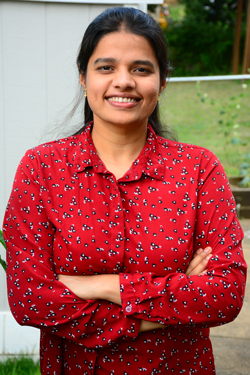 Sai Thejaswini Pamuru is a doctoral candidate in the Department of Civil and Environmental Engineering at the University of Maryland College Park. Her project aims to test the synergistic effectiveness of compost-biochar mixtures in reducing nitrogen and phosphorus leaching, and in improving vegetation growth and quality. The study takes a holistic approach to understanding the effects of compost-biochar mixtures on the physical and chemical behaviors of soils, water quality, and vegetation establishment. This study is one of the early efforts in evaluating biochar- and compost-amended soils in a large mesocosm experiment with slope considerations, mimicking roadside embankments. Given the concerns associated with composts (water quality) and wood-derived biochar (vegetative health), this study hypothesizes that a mixture of the two can improve soil fertility, plant uptake of nutrients, and soil hydraulic properties, all while minimizing nutrient losses to infiltrated or surface waters. The findings of this study expect to delineate practicable recommendations by promoting the safe use of Organic Amendments in roadside projects while updating current specifications on soil nutrients. Moreover, a comparative field evaluation of the Organic Amendments-based products and traditional stormwater management control measures, e.g., topsoil, will be available to engineers, scientists, and landscapers.
Sai Thejaswini Pamuru is a doctoral candidate in the Department of Civil and Environmental Engineering at the University of Maryland College Park. Her project aims to test the synergistic effectiveness of compost-biochar mixtures in reducing nitrogen and phosphorus leaching, and in improving vegetation growth and quality. The study takes a holistic approach to understanding the effects of compost-biochar mixtures on the physical and chemical behaviors of soils, water quality, and vegetation establishment. This study is one of the early efforts in evaluating biochar- and compost-amended soils in a large mesocosm experiment with slope considerations, mimicking roadside embankments. Given the concerns associated with composts (water quality) and wood-derived biochar (vegetative health), this study hypothesizes that a mixture of the two can improve soil fertility, plant uptake of nutrients, and soil hydraulic properties, all while minimizing nutrient losses to infiltrated or surface waters. The findings of this study expect to delineate practicable recommendations by promoting the safe use of Organic Amendments in roadside projects while updating current specifications on soil nutrients. Moreover, a comparative field evaluation of the Organic Amendments-based products and traditional stormwater management control measures, e.g., topsoil, will be available to engineers, scientists, and landscapers.
To read the full report, Click Here
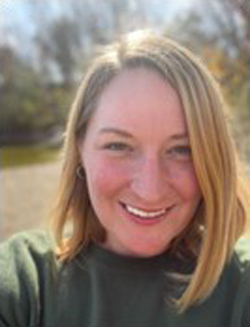 Daisy D’Angelo received her MS in Plant Pathology at The Ohio State University in 2014, and is currently pursuing a PhD with OSU’s Food, Agriculture, and Biological Engineering with a focus on compost characterization and utilization. She is also a Horticultural Scientist in Growing Media at Scotts Miracle-Gro. Daisy’s research project aims to examine the role food waste compost (FWC) can serve in establishing and maintaining healthy soils, specifically as a tool for better managing both nutrient and water usage. This research will conduct and execute field trial evaluations to study these effects of amending soil with FWC in two drastically different soil types and climates- 1. FL sand and 2. OH clay-loam. Prior to use in the field study, the composts utilized will be fully characterized as high-quality compost via STA testing, to better gauge appropriate application rates, and so that results can be duplicated by practitioners looking to capitalize on these benefits. The goal is to further quantify how compost applications can improve nutrient and water management and gain overall confidence with compost end users. She hopes this research will help highlight a valuable resource in diverting food waste from landfills to composting, which could also support both nutrient and water reduction in agricultural systems.
Daisy D’Angelo received her MS in Plant Pathology at The Ohio State University in 2014, and is currently pursuing a PhD with OSU’s Food, Agriculture, and Biological Engineering with a focus on compost characterization and utilization. She is also a Horticultural Scientist in Growing Media at Scotts Miracle-Gro. Daisy’s research project aims to examine the role food waste compost (FWC) can serve in establishing and maintaining healthy soils, specifically as a tool for better managing both nutrient and water usage. This research will conduct and execute field trial evaluations to study these effects of amending soil with FWC in two drastically different soil types and climates- 1. FL sand and 2. OH clay-loam. Prior to use in the field study, the composts utilized will be fully characterized as high-quality compost via STA testing, to better gauge appropriate application rates, and so that results can be duplicated by practitioners looking to capitalize on these benefits. The goal is to further quantify how compost applications can improve nutrient and water management and gain overall confidence with compost end users. She hopes this research will help highlight a valuable resource in diverting food waste from landfills to composting, which could also support both nutrient and water reduction in agricultural systems.
To read the full report, Click Here
Maryam Saffari Aman & Grant Goedjen – 2022/2023 University Scholarship Winners
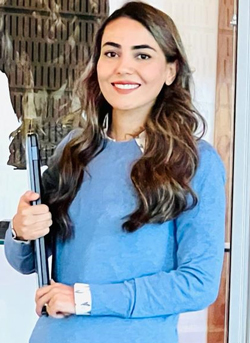 Maryam Saffari Aman is a Ph.D. student in the Department of Environmental Resources Engineering at SUNY College of Environmental Science and Forestry. Her research project will involve characterizing the prevalence and persistence of PFAS in commercially available compost. The information is useful to inform policymakers, producers of food waste compost, and potential buyers of compost about the fate and transport of persistent chemical contamination in compost and common feedstocks, as well as the potential health and environmental risks posed by land applying compost. Diversion of food waste to composting facilities commonly includes food packaging and post-consumer paper products that may contain PFAS.
Maryam Saffari Aman is a Ph.D. student in the Department of Environmental Resources Engineering at SUNY College of Environmental Science and Forestry. Her research project will involve characterizing the prevalence and persistence of PFAS in commercially available compost. The information is useful to inform policymakers, producers of food waste compost, and potential buyers of compost about the fate and transport of persistent chemical contamination in compost and common feedstocks, as well as the potential health and environmental risks posed by land applying compost. Diversion of food waste to composting facilities commonly includes food packaging and post-consumer paper products that may contain PFAS.
This project will try to determine the distribution of PFAS in compost related to physical characteristics such as particle size and the fraction of organic matter. The plan is to develop and execute research experiments that are focused on deepening understanding of the chemical, biological and physical processes that affect the quality of composting processes that use innovative feedstocks such as non-marketable paper. The plan is that the results of the experiment will determine the level and fate of persistent chemical contaminants such as PFAS in feedstock materials, including innovative use of non-recyclable paper products commonly found in food waste streams as well as the presence and persistence of per- or poly-fluoroalkyl substances (PFAS) in commercially available finished compost products.
 Grant Goedjen is a doctoral candidate with the University of Minnesota's Civil, Environmental, and Geo-Engineering department. Their areas of research interest include environmental chemistry fate and transport of emergent anthropogenic compounds focusing on pesticides and insecticides. Following graduation, Grant hopes to become a practicing Professional Environmental Engineer focusing on site assessment and remediation of hazardous materials in groundwater and soil systems.
Grant Goedjen is a doctoral candidate with the University of Minnesota's Civil, Environmental, and Geo-Engineering department. Their areas of research interest include environmental chemistry fate and transport of emergent anthropogenic compounds focusing on pesticides and insecticides. Following graduation, Grant hopes to become a practicing Professional Environmental Engineer focusing on site assessment and remediation of hazardous materials in groundwater and soil systems.
Grant’s research project aims to examine degradation or lack thereof of commonly applied pesticides in commercial composting operations. By examining rates of degradation of the most frequently-applied pesticides and insecticides in various settings, they want to determine if composting alone sufficiently removes pesticides from left-over organic material before being sold as compost and re-applied to fields. To do so, Grant will be utilizing a hybrid lab-field assessment to monitor degradation of select neonicotinoid and fipronil insecticides in both commercial and laboratory settings. They hope the results from their research will help advance strategies for environmentally-responsible pesticide use in the agriculture industry and mitigate any reapplication of excess pesticides through compost in the future.
Brooke Schmidt & Md Mahfuz Islam – 2021/2022 Young Investigator Scholarship Winners
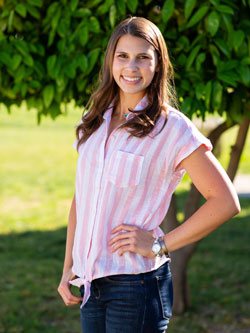 Brooke Schmidt is a senior undergraduate student majoring in biosystems engineering with a minor in math at the University of Arizona. She is interested in engineering methods for more sustainable living and learning about the vital role that soil plays in the longevity and future of our planet. She plans to continue her research and education by pursuing a graduate degree in environmental science or engineering.
Brooke Schmidt is a senior undergraduate student majoring in biosystems engineering with a minor in math at the University of Arizona. She is interested in engineering methods for more sustainable living and learning about the vital role that soil plays in the longevity and future of our planet. She plans to continue her research and education by pursuing a graduate degree in environmental science or engineering.
Brooke’s research project aims to explore how compost can be improved through mineral additives to provide longer-lasting benefits for arid cropland farmers. She seeks to determine if compost with the mineral additions of vermiculite, zeolite, or greensand can improve the capacity of soils to store carbon, increase crop yield, and address soil health deficiencies related to farming practices. She hopes that her research will result in a new solution that will increase the sustainability of arid environment agriculture.
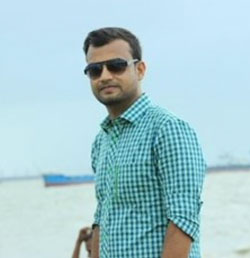 Md Mahfuz Islam joined North Carolina State University as a Ph.D. student in the Spring semester of 2021. He earned his BS in Soil, Water and Environment and MS in Environmental Science from the University of Dhaka, Bangladesh. His current research focuses on managing compacted construction sites and roadside soils to improve stormwater infiltration and reduce watershed pollution, primarily through the incorporation of composts. Soil erosion and stormwater runoff in urban and suburban areas are the biggest contributors to nonpoint source water pollution. Urbanization, particularly the construction of roads, buildings, and other structures can make both the surface and subsurface soils impervious, resulting in greater surface runoff and bulk density and reduced hydraulic conductivity, soil structure, and porosity. Environment-friendly compost amendments incorporation might be a possible solution to alleviate soil compaction and facilitate stormwater infiltrations through the soil profile. Mahfuz is working on a NC Department of Transportation (NCDOT) supported project trying to find appropriate compost rates, compost types, and application depth for specific textured degraded urban soils regarding increasing infiltration rate. This research will provide peer-reviewed recommendations for the management of degraded and compacted urban soils.
Md Mahfuz Islam joined North Carolina State University as a Ph.D. student in the Spring semester of 2021. He earned his BS in Soil, Water and Environment and MS in Environmental Science from the University of Dhaka, Bangladesh. His current research focuses on managing compacted construction sites and roadside soils to improve stormwater infiltration and reduce watershed pollution, primarily through the incorporation of composts. Soil erosion and stormwater runoff in urban and suburban areas are the biggest contributors to nonpoint source water pollution. Urbanization, particularly the construction of roads, buildings, and other structures can make both the surface and subsurface soils impervious, resulting in greater surface runoff and bulk density and reduced hydraulic conductivity, soil structure, and porosity. Environment-friendly compost amendments incorporation might be a possible solution to alleviate soil compaction and facilitate stormwater infiltrations through the soil profile. Mahfuz is working on a NC Department of Transportation (NCDOT) supported project trying to find appropriate compost rates, compost types, and application depth for specific textured degraded urban soils regarding increasing infiltration rate. This research will provide peer-reviewed recommendations for the management of degraded and compacted urban soils.
Alex Thomas & Gerard Braun – 2020/2021 Young Investigator Scholarship Winners
 Alex Thomas completed his undergraduate degrees in Biology and Waste Resources before working in Waste Management and Planning in Eastern Washington for the last three years. Most recently, Alex has become a Graduate Research Assistant at the University of Wisconsin – Stevens Point under the Soils and Waste Resources Department. Alex’s project is looking at the issue of Chronic Wasting Disease which has been a growing concern in wildlife and waste management. The prion-based disease has spread rapidly over the past decade, infecting cervid populations all over the US. The protein that causes the disease is extremely environmentally persistent, with contaminated soils shown to contain the infectious prion several years after exposure. Of the currently 58 licensed landfills in the state, only 13 are accepting CWD carcasses. This extremely limits the disposal capability for infected carcasses and has created increased costs for disposal through incineration. The plan is to investigate whether composting these infected carcasses will yield deactivation of the prion. To test this, Alex, and others working on the project from University of Wisconsin- Stevens Point, have created bio-based compost piles of infected deer carcasses and are monitoring temperature, effluent movement, and other conditions as the piles breakdown. Additionally, the plan is to expand the project to include analysis of pathogen movement and reduction through mortality composting.
Alex Thomas completed his undergraduate degrees in Biology and Waste Resources before working in Waste Management and Planning in Eastern Washington for the last three years. Most recently, Alex has become a Graduate Research Assistant at the University of Wisconsin – Stevens Point under the Soils and Waste Resources Department. Alex’s project is looking at the issue of Chronic Wasting Disease which has been a growing concern in wildlife and waste management. The prion-based disease has spread rapidly over the past decade, infecting cervid populations all over the US. The protein that causes the disease is extremely environmentally persistent, with contaminated soils shown to contain the infectious prion several years after exposure. Of the currently 58 licensed landfills in the state, only 13 are accepting CWD carcasses. This extremely limits the disposal capability for infected carcasses and has created increased costs for disposal through incineration. The plan is to investigate whether composting these infected carcasses will yield deactivation of the prion. To test this, Alex, and others working on the project from University of Wisconsin- Stevens Point, have created bio-based compost piles of infected deer carcasses and are monitoring temperature, effluent movement, and other conditions as the piles breakdown. Additionally, the plan is to expand the project to include analysis of pathogen movement and reduction through mortality composting.
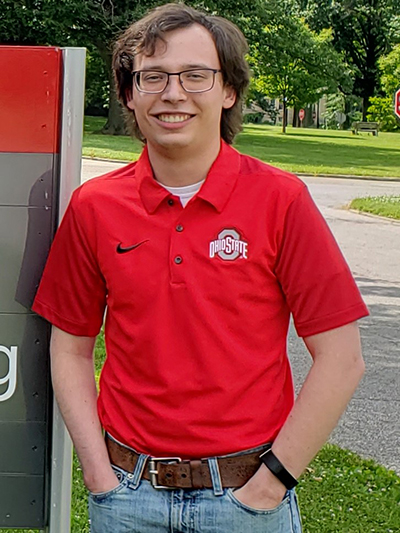 Gerard Braun attends The Ohio State University in Wooster, Ohio pursing a MS in Food, Agricultural, and Biological Engineering (FABE) with a focus on biosystems. His project involves the development of a protocol for detection of low-level persistent herbicide (< 10 ppb) in finished compost using plants in a bioassay procedure. Analytical chemical analysis of low-level herbicide contamination is difficult and expensive. Phytotoxicity levels of clopyralid, aminopyalid, aminocyclopyrachlor and picloram have been detected in finished compost. This problem of persistent herbicides in finished compost will lead to crop damage for farmers or for home gardeners. Compost facilities and home composters are faced with this problem with two solutions: expensive testing that takes time and must be sent out (if analytical facilities do not exist) or performing a bioassay trail to determine herbicide level. With the various procedures and documentation to perform these bioassay, this project will work to test these different methods and develop a peer reviewed recommendation on how to test for different contaminates. With this in mind, the goal is to better understand how to perform these bioassay and create a uniform bioassay testing procedure any compost facility or home composter could perform. The information gathered from this experiment will contribute to further prove the validity of plant-based bioassay experiments to determine herbicide contamination.
Gerard Braun attends The Ohio State University in Wooster, Ohio pursing a MS in Food, Agricultural, and Biological Engineering (FABE) with a focus on biosystems. His project involves the development of a protocol for detection of low-level persistent herbicide (< 10 ppb) in finished compost using plants in a bioassay procedure. Analytical chemical analysis of low-level herbicide contamination is difficult and expensive. Phytotoxicity levels of clopyralid, aminopyalid, aminocyclopyrachlor and picloram have been detected in finished compost. This problem of persistent herbicides in finished compost will lead to crop damage for farmers or for home gardeners. Compost facilities and home composters are faced with this problem with two solutions: expensive testing that takes time and must be sent out (if analytical facilities do not exist) or performing a bioassay trail to determine herbicide level. With the various procedures and documentation to perform these bioassay, this project will work to test these different methods and develop a peer reviewed recommendation on how to test for different contaminates. With this in mind, the goal is to better understand how to perform these bioassay and create a uniform bioassay testing procedure any compost facility or home composter could perform. The information gathered from this experiment will contribute to further prove the validity of plant-based bioassay experiments to determine herbicide contamination.
Anaya Hall, Anne Hallee & Onnr Grogan – 2019/2020 Young Investigator Scholarship Winners
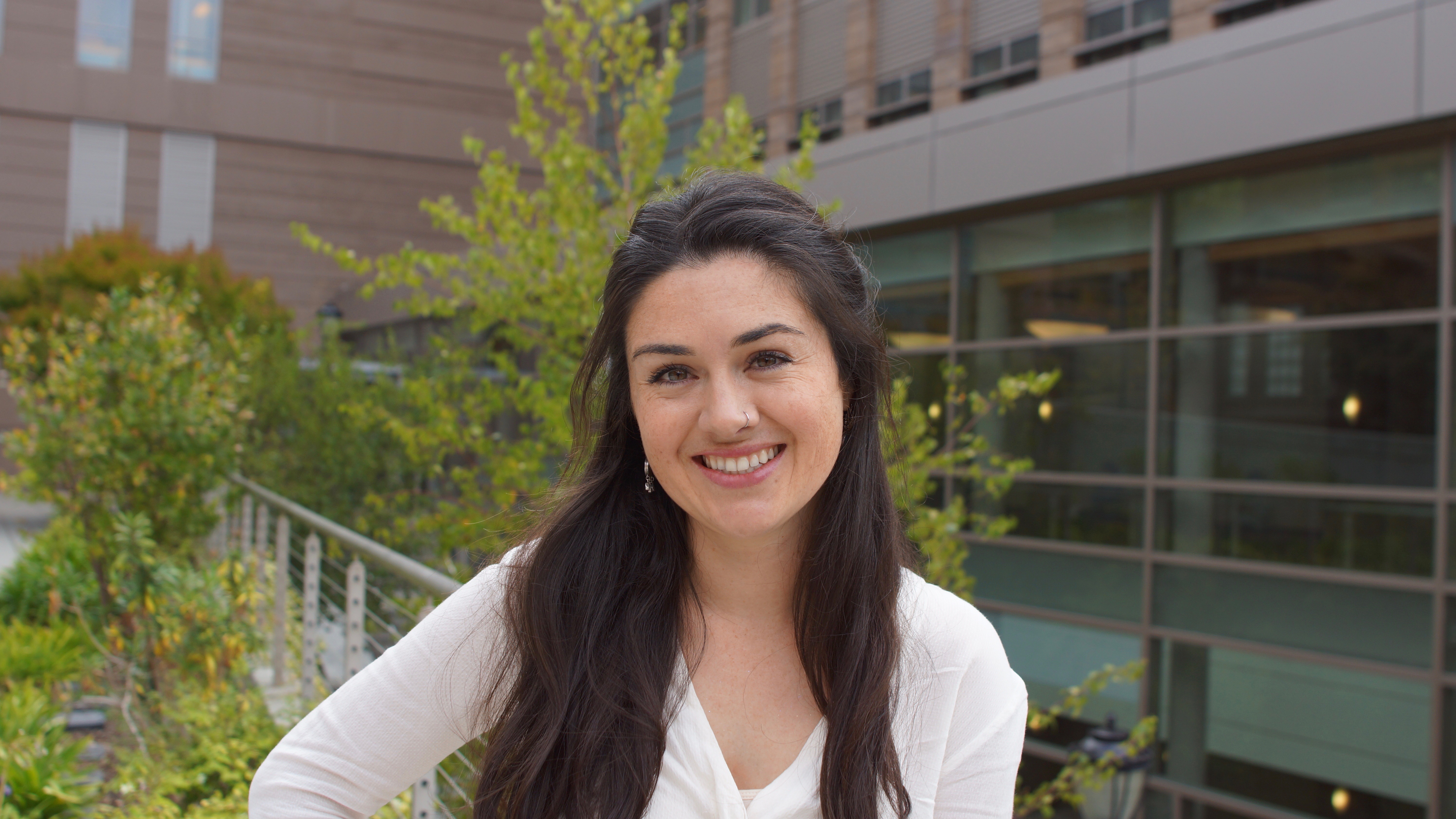 Anaya Hall is a PhD student in the Energy and Resources Group at UC Berkeley where she focuses her research on data-driven models of coupled human and natural systems. She earned an MS from Tufts University in Agriculture, Food & Environment and a BA from Stanford University in Human Biology. As a PhD student, she is building on her interdisciplinary background linking ecological and economic sciences to promote equitable, sustainable, and climate-resilient food systems.
Anaya Hall is a PhD student in the Energy and Resources Group at UC Berkeley where she focuses her research on data-driven models of coupled human and natural systems. She earned an MS from Tufts University in Agriculture, Food & Environment and a BA from Stanford University in Human Biology. As a PhD student, she is building on her interdisciplinary background linking ecological and economic sciences to promote equitable, sustainable, and climate-resilient food systems.
Anaya’s project will develop a spatial model for the state of California to connect organic waste streams with composting infrastructure and working lands in order to critically evaluate the feasibility and anticipated abatement costs of using composted municipally-generated organic waste as a soil amendment to both sequester carbon and meet state-level diversion requirements. This analysis combines spatial optimization and life-cycle assessment to consider the technical, economic, and institutional potential of actively managing the State’s food scraps and green waste for climate change mitigation. The research models a range of scenarios to estimate the cost per ton CO2eq of this abatement strategy and provides the first approximation of the potential impacts of organic waste management for soil carbon in California.
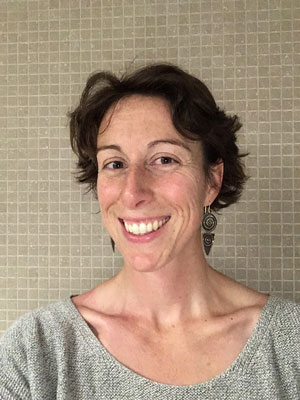 Anne Hallee is currently enrolled at The Evergreen State College in Olympia Washington pursuing her Bachelors of Science Degree with a focus in Chemistry. She brings a background in sustainable agriculture and nutrient management planning to her academic focus in plant nutrient cycling and the symphony of microbiology at play in soil chemistry. She plans to work in the agricultural sector as an educator and researcher.
Anne Hallee is currently enrolled at The Evergreen State College in Olympia Washington pursuing her Bachelors of Science Degree with a focus in Chemistry. She brings a background in sustainable agriculture and nutrient management planning to her academic focus in plant nutrient cycling and the symphony of microbiology at play in soil chemistry. She plans to work in the agricultural sector as an educator and researcher.
Anne’s research project will investigate phosphorus availability in composts of varying feedstocks. She will assess the amounts of soluble, plant available phosphorous typical of compost samples from static aerated composting facilities targeting three groups of feedstock types: manure based, green waste based and food scrap-based composts when applied to a low fertility soil. Her project will involve compost characterizations, soil blends and an incubation mimicking a growing year to evaluate the representative phosphorous availability in land applied compost products. The information gathered from this study will inform the composting community of phosphorus content within various feedstocks, offer guidance for determining composting recommendations that limit phosphorus losses into the watershed, and inform best management parameters for manure-based compost, green waste-based compost and food waste-based compost.
Winner of the Special North Carolina Scholarship – donated by the North Carolina Composting Council
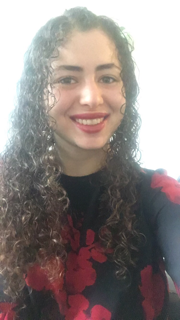 Onnr Grogan is a junior in the undergraduate Biological Engineering program at North Carolina Agricultural and Technical State University. The objective of her project is to determine how the method and schedule of turning a compost affects the temperature profile, nutrient contents, and time required for production of the compost. Wooden open-air pens will be compared to tumbler bins for ease and efficiency. Additionally, the turning schedule will be varied to determine the ideal frequency for compost turning with each method.
Onnr Grogan is a junior in the undergraduate Biological Engineering program at North Carolina Agricultural and Technical State University. The objective of her project is to determine how the method and schedule of turning a compost affects the temperature profile, nutrient contents, and time required for production of the compost. Wooden open-air pens will be compared to tumbler bins for ease and efficiency. Additionally, the turning schedule will be varied to determine the ideal frequency for compost turning with each method.
The long-term goal of her project is to develop the infrastructure and a process necessary to begin a comprehensive compost program through the main dining hall on campus. A cost benefit analysis will be performed to determine the economic sustainability of a continuous composting program compared to the current process of discarding all food in a trash compactor. When the project is completed, the plan is to present a proposal for a continuous composting program to the NC A&T Chancellor and a representative of Sodexo, the school’s food service provider.
Donald De Alwis & Sally Landefeld – 2018/2019 Young Investigator Scholarship Winners
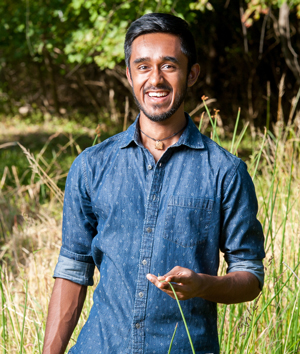 Donald De Alwis is currently studying towards dual degrees in Environmental Science and Public Health Science at the University of Maryland, College Park. He specializes in environmental health, and enjoys exploring the interface between humans and the environment. He hopes to continue researching the human-environment nexus after his bachelor’s degree through a graduate or professional degree program.
Donald De Alwis is currently studying towards dual degrees in Environmental Science and Public Health Science at the University of Maryland, College Park. He specializes in environmental health, and enjoys exploring the interface between humans and the environment. He hopes to continue researching the human-environment nexus after his bachelor’s degree through a graduate or professional degree program.
Donald’s project focuses on the use of locally sourced compost to facilitate hydric soil conditions in wetland restoration. He will use cow manure and Bloom, a biosolid produced by a local water utility company, at three different cure times. Through a soil microcosm experiment, he will analyze ferrous iron and methane production with the intention of determining which soil amendment and cure time maximizes microbial activity while reducing greenhouse gas production. The results of the experiment will determine the feasibility of a novel use for compost, and will inform restoration practices for Maryland’s vast wetland ecosystems.
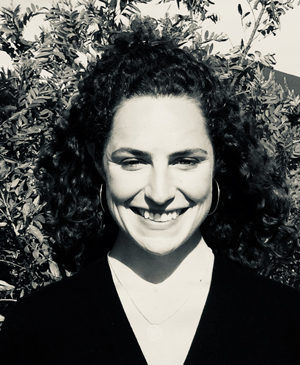 Sally Landefeld received a BA in chemistry from Occidental College in Los Angeles. Upon realizing that many preventable chronic diseases stem from lifestyle and food nutritional quality, Sally changed her plans to attend medical school and left the biomedical research field to focus on the root of the issue: soil health. She earned a MS in Environmental Science and Engineering from Oregon Health and Science University in 2017 and is pursuing a PhD in Civil and Environmental Engineering at the University of Washington.
Sally Landefeld received a BA in chemistry from Occidental College in Los Angeles. Upon realizing that many preventable chronic diseases stem from lifestyle and food nutritional quality, Sally changed her plans to attend medical school and left the biomedical research field to focus on the root of the issue: soil health. She earned a MS in Environmental Science and Engineering from Oregon Health and Science University in 2017 and is pursuing a PhD in Civil and Environmental Engineering at the University of Washington.
Sally’s research aims to characterize the relationship between soil health and plant health: Does healthier soil grow healthier food? This project is looking at common garden crops grown in four types of soil amendments: composted biosolids from Pierce County (TAGRO), composted biosolids from King County (GroCo), vermicompost, and bokashi. These soils will be tested for a suite of chemical, physical, and biological properties to characterize the soil health, and crops are undergoing analysis for macronutrients, micronutrients, vitamins, and phytonutrients that act as potent antioxidants. Sally is hoping that her project may help “close the loop” on urban waste, provide fertile soil to local urban gardens, and sequester carbon in the form of soil organic matter.
Russell Galanti – 2017/2018 Young Investigator Scholarship Winner
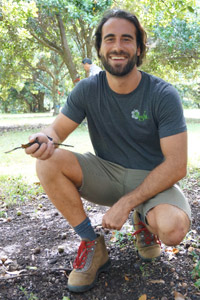 Russell Galanti is from Maryland originally and got his undergraduate degree in Horticulture Science from Temple University in Pennsylvania. He is now completing his Master's in Tropical Plant and Soil Science at the University of Hawaii at Manoa. He plans to continue his research in improving agro-ecosystem cultural management under the context of sustainable agriculture.
Russell Galanti is from Maryland originally and got his undergraduate degree in Horticulture Science from Temple University in Pennsylvania. He is now completing his Master's in Tropical Plant and Soil Science at the University of Hawaii at Manoa. He plans to continue his research in improving agro-ecosystem cultural management under the context of sustainable agriculture.
Russell's project focused on looking at the effects of five locally sourced soil amendments on plant health and production and soil properties in macadamia orchards. The treatments were wood chip mulch, macadamia husk mulch, husk mulch with biochar, husk mulch with lactic acid bacteria inoculation, and soil profiling. He looked at tree yield, root growth, and tissue nitrogen, as well as soil organic matter, soil nitrogen, pH and electrical conductivity. This project focused on protecting Hawaii's limited natural resources, reducing the need for external resources. A cost benefit analysis was also be performed to determine the economic suitability of such treatments.
Clara Tang – 2016/2017 Young Investigator Scholarship Winner
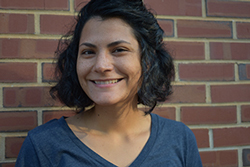 Clara Tang, a master's student at North Carolina State, was chosen based on her project - looking at exploring alternative ways to manage soils more sustainably and seeking to understand the impacts of the use of compost on soil health. Her project evaluated the interactive effect of mycorrhiza and compost on soil and plant health by looking at the change in physical, chemical, and biological properties of soil and how that relates to plant growth. The main focus of the study was to determine the changes in the microbial communities by contrasting sterilized treatments to non-sterilized and determining if the beneficial effects of compost and mycorrhiza were due solely to nutrient addition or also enhanced by the microorganism present in these amendments.
Clara Tang, a master's student at North Carolina State, was chosen based on her project - looking at exploring alternative ways to manage soils more sustainably and seeking to understand the impacts of the use of compost on soil health. Her project evaluated the interactive effect of mycorrhiza and compost on soil and plant health by looking at the change in physical, chemical, and biological properties of soil and how that relates to plant growth. The main focus of the study was to determine the changes in the microbial communities by contrasting sterilized treatments to non-sterilized and determining if the beneficial effects of compost and mycorrhiza were due solely to nutrient addition or also enhanced by the microorganism present in these amendments.
Brandon Erny – 2015-2016 Young Investigator Scholarship Winner
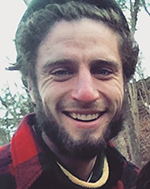 Brandon Erny’s winning proposal, "Investigating the use of biochar to increase nutrient retention in compost-production, and following compost spreading," tested the role of biochar, charcoal used for soil amendment purposes, on retaining soil nutrients that normally escape in the compost process. Erny was compost manager at Sterling College in Vermont, where he studied carpentry and sustainable design.
Brandon Erny’s winning proposal, "Investigating the use of biochar to increase nutrient retention in compost-production, and following compost spreading," tested the role of biochar, charcoal used for soil amendment purposes, on retaining soil nutrients that normally escape in the compost process. Erny was compost manager at Sterling College in Vermont, where he studied carpentry and sustainable design.